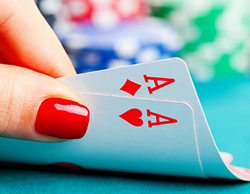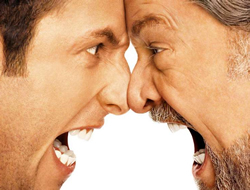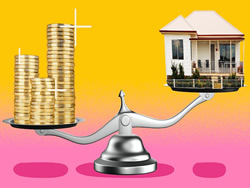Meg Watson* says a good poker face has benefits beyond bluffing.
 Do you have trouble playing it cool in high-stress situations? You’re not the only one.
Do you have trouble playing it cool in high-stress situations? You’re not the only one.
There are so many of us out here rambling our way through Zoom meetings, sweating through first dates, trying to stay calm during a tense conversation.
It’s not necessarily a bad thing.
As research professor Brené Brown (or anyone who’s read Brené Brown) will tell you, there’s real power in vulnerability.
But there are also times when it’s convenient to be able to hide your hand.
“It’s so important at the poker table to not get emotional because it affects your decisions,” says professional poker player Jackie Glazier.
“It’s not even just about hiding your emotions — it’s about controlling them. [And] controlling your emotions can be great in a lot of situations.
“It’s about coming across confident when you’re not feeling that way.”
Want to work on your own poker face? Ms Glazier and fellow poker pro Tanja Vujanic have a few tips.
Start with your posture
“One of the best things you can do is focus on your posture,” Ms Vujanic told ABC Radio Perth.
She says she always makes an effort to sit up straight and tall at the poker table: “When you take up space … it becomes easier to manage your emotions and feel like you’re in control of the situation.”
There’s actual science to support this.
The idea of “power posing” was popularised by social psychologist Ann Cuddy in 2012: she reported that adopting a confident pose (think: Wonder Woman) for a few minutes before a big event could literally make you more confident.
The idea that these poses can tangibly decrease the stress levels in your body has been repeatedly disputed, but multiple studies have confirmed that people report feeling more powerful after doing it.
Find a way to ‘reset’ when you need
“I count a lot at the table,” Ms Glazier says. “It’s not counting cards — it’s just counting. I’ll stare at a spot and count to 100 if I need to.
“It’s a way that I can take myself away from the situation.”
Ms Glazier says this is a handy way for her to “reset”.
If something provokes a big emotional response, she has another thing to focus on and bring her back to a more neutral and focused state.
“I have a really analytical mind, so counting soothes me and distracts me.
“It’s a very mundane task. But something else might work for someone else.
“You might think of sitting in a park under a tree.”
Focus on your breath
If you’re struggling for something else to focus on, your breath is a great place to start.
It’s well established that stress affects your breathing patterns.
When you’re anxious, your breaths are generally quick and shallow. If you take long and deep breaths instead, there’s a good chance you can calm yourself down.
Reducing anxiety — or even just seeming less anxious — is crucial in high-stakes situations, Ms Glazier says.
“When you’re playing for a lot of money and you’ve got all your chips in on a complete bluff, it’s so important to not give away anything to your opponent.”
Be observant
“At a poker table you should be watching every single thing,” says Ms Vujanic.
“You need to be really in tune with what you’re doing and your own body language, but also very observant with other people.”
Is the person sitting across from you breathing heavier? Are they fidgeting?
Ms Vujanic says you can pick up little cues from these things and adjust your own behaviour accordingly.
This can give you a sense of control in the situation.
Ms Glazier thinks of this as a kind of rough intuition, honed over time.
And it regularly comes in handy in her social life too. She says she’s often the only one to pick up when a friend is upset or putting on a brave face.
Use perceptions to your advantage
Sometimes the best poker face is a “resting bitch face”, as Ms Glazier puts it, and sometimes it’s a smile.
She’ll occasionally fake a bit of friendliness to create the impression that she likes someone — “even if I really dislike the person” — to work a situation to her advantage.
The trick is staying in control of your emotions in the moment.
Professional poker is a very male-dominated field, and Ms Glazier says some men have a tendency to talk down to women at the table.
That can be hard to deal with, she says, because “the way they talk to you can be very condescending”.
“But I think sometimes they underestimate females as well: they give you information that they wouldn’t necessarily give to another male.”
Have a pre and post game ritual
Both women point out, however, that it’s never just as simple as burying your real emotions — you also have to make time to reckon with what you’re really feeling.
Ms Vujanic prepares for a big event with some meditation and emotional prep. “I think about all the possible outcomes that could happen,” she says.
“You might be playing a really big hand and then get unlucky and lose. Know how you’re going to react to that.”
Ms Glazier also makes time to regroup afterwards.
“If something happens at the table and I [don’t have time] to process it, sometimes I’ll write it down in a notebook and I’ll look at it the next day.
“Then I know I don’t have to dwell on it at the table, while the next hand is being dealt.”
*Meg Watson is a journalist with ABC Everyday.
This article first appeared at abc.net.au.












